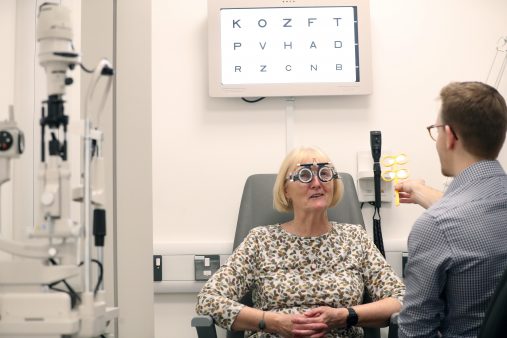Transforming eyecare services in Wales
2 March 2021
An innovative partnership to bring critical eyecare appointments closer to patient’s homes has helped to transform services in Wales. In December 2019, nearly 115,000 patients at risk of irreversible sight loss were waiting for a hospital eye appointment in Wales. Here, Cardiff University optometrist Sharon Beatty explains how High Street optometrists, clinicians and Welsh Government plan to reduce the burden on hospitals.
 “When an ageing population combines with the risks associated with diseases such as diabetes, it’s a recipe for increased pressure on eyecare services. Back in 2019, waiting lists for eye appointments were growing – with some 38% of those on the list having already exceeded their target appointment date.
“When an ageing population combines with the risks associated with diseases such as diabetes, it’s a recipe for increased pressure on eyecare services. Back in 2019, waiting lists for eye appointments were growing – with some 38% of those on the list having already exceeded their target appointment date.
Capacity within the hospital was fixed, which meant we had to find different ways of working. Through Cardiff University’s Clinical Innovation Accelerator, we collaborated with Accelerate, which helps innovators in Wales translate ideas into solutions that can be adopted in health and care.
The programme was able to provide a clear structure, partners and time frame that could help us change things – in short, they put us in touch with the right people who could support a project to establish a revolutionary clinical model.
Accelerate is led by Life Sciences Hub Wales, in partnership with Cardiff University (Cardiff Innovation Accelerator), Swansea University and University of Wales Trinity Saint David.
Rather than providing funding or grants, the programme offers the opportunity to tap into academic expertise, a thorough understanding of the life sciences ecosystem, and the latest f
acilities needed by innovators and entrepreneurs to realise their ideas, which is exactly what we needed.

Thanks to Welsh Government support, Cardiff and Vale University Health Board has developed a service framework in which registered High Street optometrists assume the management of designated high-risk eye patients. The use of state-of-the-art imaging technology, dedicated software and electronic patient records allows patients to undergo tests at their local optometry practice. Images and results are uploaded for review by a consultant.
The actions have been mapped and monitored by my colleague Angharad Hobby, optometrist and research associate, who assessed the relief of pressure on ophthalmology services through community care. As part of the project, Ms Hobby conducted research around patient and practitioner experiences to inform future decisions about the provision of eye care in Wales.
In total, Transforming Eyecare Services Wales is supporting a series of novel pilot services to manage up to 9,000 designated patients across five domains of care: Glaucoma (new referrals and follow-up); Wet Age-Related Macular Degeneration; Diabetic Retinopathy; and Unscheduled Eye Casualty.
The scheme brings together so many benefits: reduced waiting times, adoption of new technologies, increased capacity in secondary care to assess and manage eye care patients, new skills and competency training for independent optometrists, closer links with secondary care which could lead to the provision of additional services by optometry enterprises. In addition, it’s brought Cardiff University expertise closer to eyecare-related health in a community setting and will lead to peer reviewed publications and new health economics insights in ophthalmic care.
The Clinical Innovation Accelerator contributed to the TECSW project by helping to identify and support a number of key themes including increased scope and capability of high street opticians, promoting industry expansion and employment opportunities; innovation through a new digitally integrated system, using local resources, reducing waiting times, hospital visits and travel; and the promotion of increased skill sets across the optometry profession, utilising the latest equipment and IT.
In the words of Sali Davis, Chief Executive Optometry Wales, the whole project has “highlighted the difference made to patients when care is provided closer to home, within the community and how the skills of primary care optometrists can be best utilised to facilitate a positive experience of healthcare for the patient.”
In future, we believe the technology could lead to diversification of other domains of health and social care employing e-patient records, prompting future collaboration between commercial, academic, third sector and clinical partners with potential to roll out our model across NHS Wales.”
Sharon Beatty, School of Optometry and Vision Sciences, Cardiff University